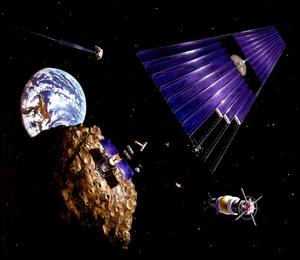
NASA, Artist concept by Denise Watt
In a curious exchange in last night's GOP presidential debate, Mitt Romney attacked Newt Gingrich's previously stated position favoring the enabling of a lunar mining industry. Gingrich strongly defended his position in a general way (as Romney brought up multiple issues in one statement).
A video clip of that portion of the debate is linked here.
For many politically minded viewers, the topic of lunar mining must have seemed a rather curious topic to come up in a presidential debate. However, among a community of entrepreneurs, scientists and space planners, the potential use of resources from the Moon and other celestial bodies is a very real possibility.
Evidence going back to the soil samples brought back by the Apollo astronauts to data obtained from robotic probes recently sent by the US and other nations indicate the presence of useful resources on and in the Moon. Evidence of significant amounts of lunar water (in the form of ice) has been detected in recent years. Lunar scientist Paul Spudis envisions a plan to extract this water and break it down into its constituents hydrogen and oxygen to provide fuel for propelling vital space assets.
By having a system where the vehicles are refueled from the resources extracted on the Moon, a system is created that routinely accesses the Moon and allows for returning to Earth, but all the other points in between can be accessed as well.
"We create a transportation system that accesses all those points between Earth and Moon. The significance of that is, much of our satellite assets reside there," said Spudis, "for example communication satellites and weather monitoring satellites reside in geosynchronous orbit, (about 36,000 km above the Earth’s equator) and right now we cannot reach that from low Earth orbit. If we have system that can routinely go back and forth to the Moon, we could also go to these high orbits where a lot of commercial and national security assets are."
Other experts describe resources on the Moon that could help America and the world access new energy sources. Perhaps most significantly, President George W. Bush's science adviser, the late John Marburger, saw the Moon and other bodies in the Solar System as a part of our economic sphere.
As I see it, questions about the vision boil down to whether we want to incorporate the Solar System in our economic sphere, or not. Our national policy, declared by President Bush and endorsed by Congress last December in the NASA authorization act, affirms that, "The fundamental goal of this vision is to advance U.S. scientific, security, and economic interests through a robust space exploration program." So at least for now the question has been decided in the affirmative.
Gingrich's ideas for creating incentives for commercial space activities include tax breaks and prizes, but do not appear to include corporate preferences such as Solyndra-style loan guarantees. (Gingrich's space policy proposals are seen as too radical by some in the space industry, but that is another whole discussion.)
I hope that Gingrich will have the opportunity to further explain his space policy proposals during the campaign and I hope that Romney and the other candidates will take the time to become more informed on this area.
Along with tax reduction and simplification and regulatory reform, enabling new industries including commercial space is an integral part of a pro-growth agenda. The national security implications of space leadership can not be ignored. And human expansion into and development of space can also contribute to a culture of life by providing resources for future generations (as opposed to posing threats to life and liberty by dealing with supposed resource shortages through "population control").
No comments:
Post a Comment